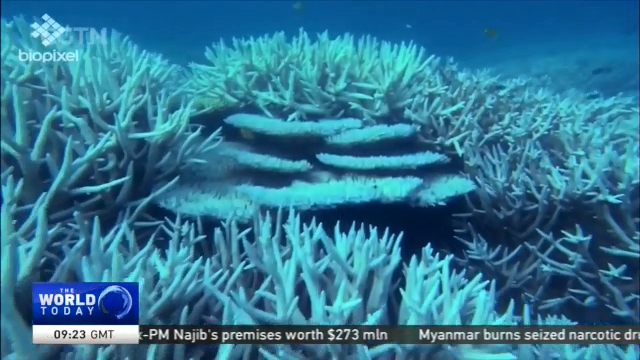
19:18, 27-Jun-2018
Saving the Great Barrier Reef: Australia's Reef Restoration Project is underway
Updated
18:25, 30-Jun-2018
03:03

Scientists say climate change has taken a severe toll on the world's largest living organism - Australia's Great Barrier Reef. Nearly half of the reef's living coral has died from the effects of warming ocean water. Now a team of researchers is in the midst of an extensive efforts to reverse that trend. Greg Navarro has more.
At the Australian Institute of Marine Science in Queensland, Neal Cantin and a group of researchers are pushing living corals to the limit.
"These corals are going through a summer heat stress."
Stress for coral is a killer. And one of the biggest causes of stress for the Great Barrier Reef is the impact from climate change.
NEAL CANTIN RESEARCH SCIENTIST, AUSTRALIAN INSTITUTE OF MARINE SCIENCE "We are seeing climate change degrading the reef faster than every before."
Warming ocean waters have led to more frequent and more widespread coral bleaching events - - the last two occurred in 2016 and 2017. Bleaching robs coral of the ability to protect itself.
LINE BAY SENIOR RESEARCH SCIENTIST, AUSTRALIAN INSTITUTE OF MARINE SCIENCE "We believe that those 2 events killed about half of the corals that we had left on the reef."
Which brings us back to why Cantin is stressing the corals in these tanks.
NEAL CANTIN RESEARCH SCIENTIST, AUSTRALIAN INSTITUTE OF MARINE SCIENCE "Testing whether we can enhance the tolerance of offspring by exposing baby corals and the parents to future climate stress."
That idea of better arming corals to cope with a changing environment is the goal behind a first of its kind, multi-million dollar government funded reef adaptation and restoration program.
LINE BAY SENIOR RESEARCH SCIENTIST, AUSTRALIAN INSTITUTE OF MARINE SCIENCE "The issue with the GBR is its size - it is an enormous ecosystem, it is the size of Italy and so the approaches that we are exploring at the moment really are aimed at being able to address problems on a large spacial scale."
This vast ecosystem not only helps to sustain so much life, it also generates nearly $6 billion AUD for the country's economy.
GREG NAVARRO QUEENSLAND "One of the things scientists are doing is exposing coral to what they call end of century conditions, what they believe the water will be like in roughly 8 decades significantly warmer, with higher levels of acid and CO2, the kind of conditions most coral can't survive."
But some of the corals here have managed to survive. "We want to identify what those corals that can deal with the future have that the others didn't."
Another technology being tested here involves a kind of reef sunscreen to help reduce the harmful effects from sunlight.
NEAL CANTIN RESEARCH SCIENTIST, AUSTRALIAN INSTITUTE OF MARINE SCIENCE "They are seeing too much light and they are seeing too much heat. The amount of oxidised stress within the tissues, just like when you get a cold or the flu, the corals are going through a really severe fever."
The techniques being developed here are still years away from being applied outside of the lab, but scientists say the early results are promising.
LINE BAY SENIOR RESEARCH SCIENTIST, AUSTRALIAN INSTITUTE OF MARINE SCIENCE "Our hope is that the tools that we are developing for the GBR will be applicable for other reefs around the world."
To help other countries maintain their coral reefs for future generations. Greg Navarro, CGTN, Townsville.

SITEMAP
Copyright © 2018 CGTN. Beijing ICP prepared NO.16065310-3
Copyright © 2018 CGTN. Beijing ICP prepared NO.16065310-3